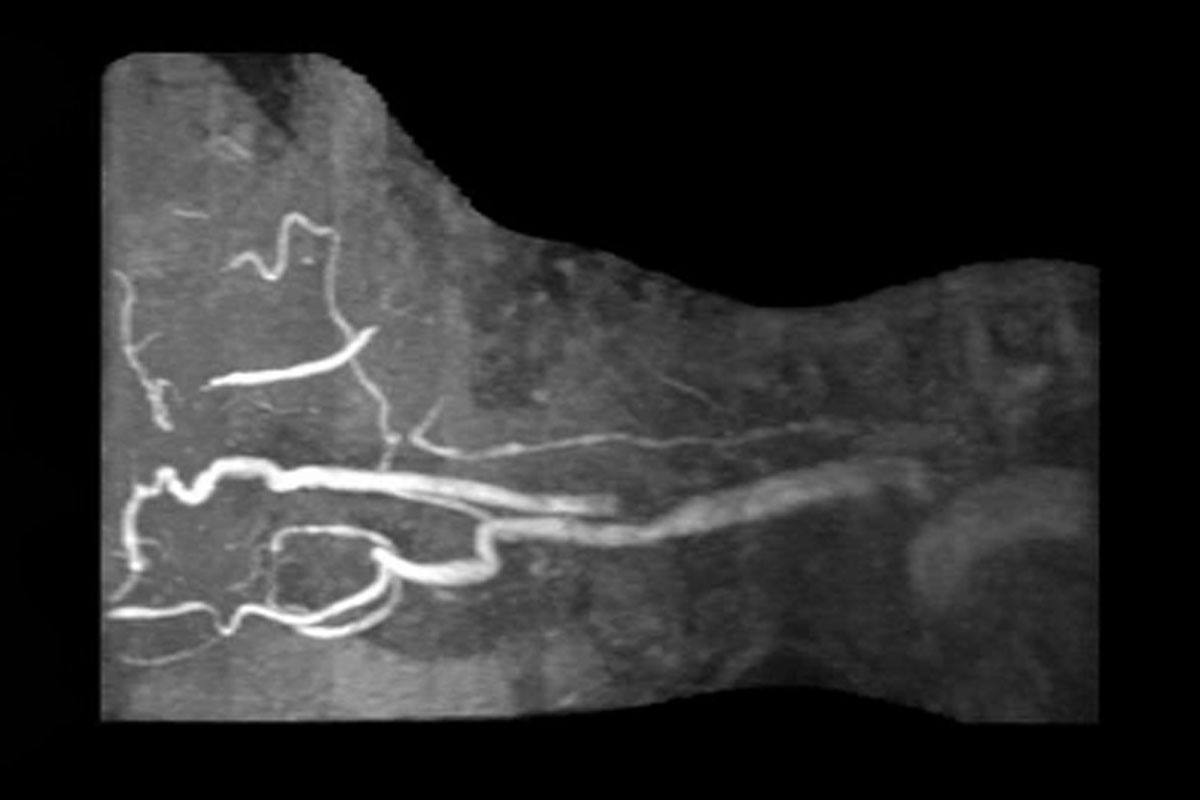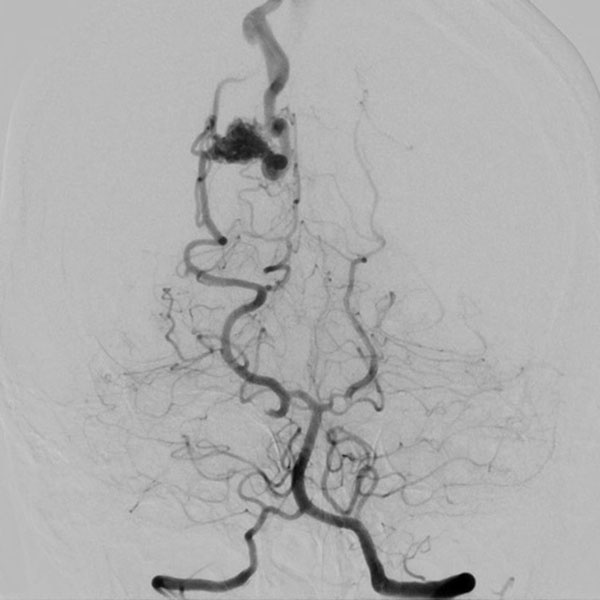Cerebrovascular conditions encompass a group of disorders that affect the blood vessels supplying the brain. These conditions can disrupt blood flow, leading to potentially serious consequences such as strokes or aneurysms. With Dr. Lekovic’s expertise, individuals with cerebrovascular conditions receive personalized plans to ensure the best possible outcomes. These are some of the common cerebrovascular conditions treated by Dr. Lekovic.
Cerebral Aneurysm
A cerebral aneurysm is a bulging and weakened area in the wall of a brain artery. These aneurysms can vary in size and are at risk of rupturing, causing bleeding into the surrounding brain tissue (hemorrhage). Most cerebral aneurysms are asymptomatic and are often discovered incidentally during imaging tests for unrelated conditions. However, a ruptured aneurysm can lead to a life-threatening condition known as a subarachnoid hemorrhage. Proper diagnosis is essential to prevent complications and ensure timely intervention.

Possible Symptoms Of Cerebral Aneurysm:
- Usually asymptomatic (unruptured)
- Severe headache (when ruptured)
- Sudden and severe onset of headache
- Nausea and vomiting
- Stiff neck
- Sensitivity to light (photophobia)
- Blurred or double vision
- Loss of consciousness
- Seizures
- Weakness or numbness in the face or limbs
Arteriovenous Malformation (AVM)
Arteriovenous malformation (AVM) is an abnormal tangle of blood vessels in the brain or spinal cord. These malformed vessels can disrupt normal blood flow and increase the risk of bleeding (hemorrhage) into the surrounding tissue. While some AVMs may remain asymptomatic, others can cause neurological symptoms, depending on their location and size. Prompt diagnosis is essential, as an AVM rupture can lead to serious and potentially life-threatening consequences.
Possible Symptoms Of Arteriovenous Malformation (AVM):
- Asymptomatic (unruptured)
- Severe headache (when ruptured)
- Sudden and severe onset of headache
- Seizures
- Weakness or numbness in the face or limbs
- Vision problems
- Difficulty speaking or understanding speech (aphasia)
- Loss of coordination or balance
- Memory problems or confusion
- Nausea and vomiting (when ruptured)
Carotid Artery Stenosis
Carotid artery stenosis refers to the narrowing of one or both carotid arteries, major blood vessels in the neck that supply blood to the brain. This condition can result from atherosclerosis, where fatty deposits accumulate within the artery walls, restricting blood flow to the brain. In severe cases, carotid artery stenosis may increase the risk of stroke, as it reduces the supply of oxygen and nutrients to the brain. Proper evaluation is crucial to managing this condition and preventing potential complications.

Possible Symptoms Of Carotid Artery Stenosis:
- Asymptomatic (in some cases)
- Transient ischemic attack (TIA) or mini-stroke
- Sudden weakness or numbness in the face or limbs (one side of the body)
- Difficulty speaking or understanding speech
- Dizziness or loss of balance
- Severe headache
- Trouble swallowing
- Facial paralysis (rare)
Vertebrobasilar Insufficiency
Vertebrobasilar insufficiency (VBI) refers to reduced blood flow through the vertebral and basilar arteries, which supply blood to the brainstem and cerebellum. This condition is often caused by atherosclerosis or compression of the arteries. VBI can lead to temporary or permanent neurological symptoms, such as dizziness, double vision, slurred speech, or weakness. Episodes of VBI may be triggered by certain head movements or positions. Timely evaluation is essential to address the underlying cause and prevent potential complications.

Possible Symptoms Of Vertebrobasilar Insufficiency:
- Dizziness or vertigo
- Double vision (diplopia)
- Slurred speech (dysarthria)
- Weakness or numbness in the face or limbs
- Difficulty swallowing (dysphagia)
- Loss of balance or coordination
- Blurred vision or temporary blindness
- Drop attacks (sudden falls without losing consciousness)
- Nausea and vomiting (in some cases)
- Sensation of spinning (vertigo) with head movements
Moya-Moya Disease
Moya-Moya disease, which translates to a “puff of smoke” in Japanese, is a rare and progressive cerebrovascular disorder characterized by the narrowing and blockage of certain arteries at the base of the brain. This results in the development of a network of small blood vessels, which attempts to compensate for the reduced blood flow. Individuals with Moya-Moya disease are at increased risk of stroke and transient ischemic attacks (TIAs). The cause is not fully understood, but early diagnosis is essential for appropriate management.
Possible Symptoms Of Moya-Moya Disease:
- Headache
- Seizures
- Transient ischemic attacks (TIAs)
- Weakness or paralysis in the face, arm, or leg
- Numbness or tingling in the face, arm, or leg
- Vision problems
- Speech difficulties
- Cognitive decline
- Developmental delays (in children)
- Sudden and severe headache (rupture of a blood vessel)
Other Cerebrovascular Conditions:
While this list includes some of the other cerebrovascular conditions treated by Dr. Gregory Lekovic, it is not exhaustive. Dr. Lekovic offers comprehensive care for a wide range of cerebrovascular issues not listed above. If you have concerns or questions about any of these conditions or others not listed here, don’t hesitate to reach out to Dr. Lekovic’s office for more information.
- Cerebral Aneurysm
- Arteriovenous Malformation
- Cavernous Malformation
- Brainstem Cavernous Malformation
- Dural Arterio-Venous Fistula
- Vertebrobasilar Insufficiency
- Moya-Moya Disease
- Carotid Artery Stenosis
- Carotid Body Tumor
- Glomus Tumor
- Extracranial-Intracranial Bypass Surgery
- Vertebral Artery Origin Stenosis
Intracranial Atherosclerosis (ICAD)
Intracranial Atherosclerosis (ICAD) is a vascular disorder characterized by the buildup of fatty deposits within the brain’s arteries. This narrowing of blood vessels can impede blood flow to vital brain regions, increasing the risk of strokes, transient ischemic attacks (TIAs), or other neurological issues. Management typically includes lifestyle modifications, medications to control risk factors, and, in severe cases, interventions like angioplasty or stent placement to restore blood flow and reduce the risk of debilitating neurological events. Early diagnosis and treatment are crucial to prevent serious consequences.
EC-IC Bypass
Extracranial-Intracranial (EC-IC) bypass surgery is a neurosurgical procedure designed to restore blood flow to the brain when there is a blockage in the major arteries. During the surgery, a healthy blood vessel from outside the skull is connected to an artery within the brain to create an alternate route for blood circulation. This procedure can be essential in treating conditions like intracranial atherosclerosis or aneurysms to prevent strokes and maintain adequate brain perfusion.
Brainstem Cavernous Malformation
Brainstem cavernous malformation, also known as cerebral cavernous malformation (CCM), is a rare vascular disorder where clusters of abnormal, thin-walled blood vessels form in the brainstem. These cavernomas can bleed, causing neurological symptoms like headache, dizziness, or even stroke-like episodes. Treatment options may include monitoring, medication, or surgery, depending on the severity and symptoms. Due to the critical location within the brainstem, managing these malformations often requires a multidisciplinary approach and careful consideration of risks and benefits. Dr. Gregory Lekovic successfully performs surgeries on cavernous malformations in Los Angeles.
Carotid Body Tumor
A carotid body tumor is a rare abnormal growth originating from the carotid body, a small cluster of cells located near the carotid artery in the neck. These tumors are usually benign but can cause symptoms due to their location. Symptoms may include a pulsatile neck mass, difficulty swallowing, voice changes, or cranial nerve dysfunction. Carotid body tumors should be evaluated promptly to determine their nature and potential impact on surrounding structures.
Possible Symptoms Of Carotid Body Tumor:
- Pulsatile neck mass
- Difficulty swallowing (dysphagia)
- Changes in voice (hoarseness)
- Cranial nerve dysfunction
- Sensation of fullness in the throat
- Dizziness or lightheadedness
- Headache
- Changes in vision or eye movements
- Tinnitus (ringing in the ears)
- Facial pain or numbness (rare)
Contact Us Today
Dr. Lekovic and his specialized team are dedicated to providing comprehensive neurological care. If you or a loved one are experiencing symptoms related to cerebrovascular conditions or any other neurological issues, don’t hesitate to contact us. Dr. Lekovic’s expertise and personalized approach ensure you receive the best evaluation and treatment options. Contact us for a comprehensive evaluation of possible cerebrovascular conditions, including cavernous malformations in Los Angeles.

